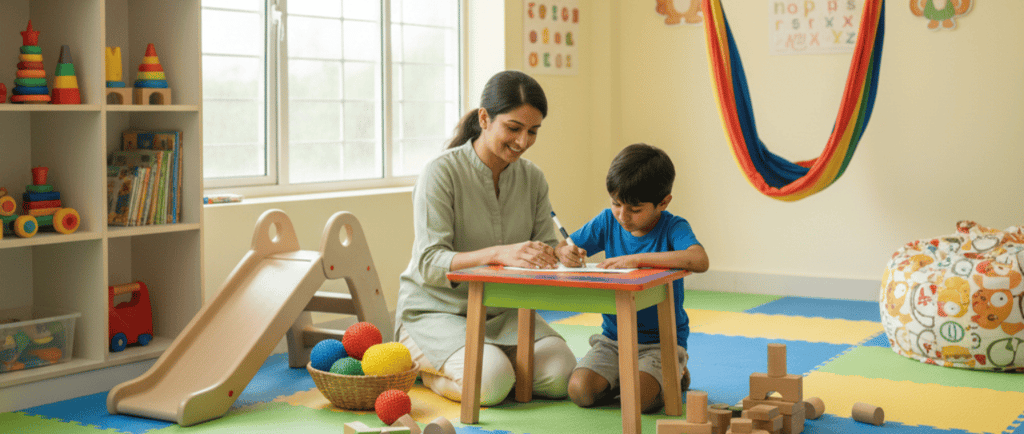Signs Your Child May Need Occupational Therapy: A Parent’s Guide
Understand when your child needs OT
OCCUPATIONAL THERAPY
Dr. Dipak Kumar
10/2/20253 min read


As parents, we all want our children to grow, learn, and thrive in their daily lives. But sometimes, you may notice that your child struggles with simple activities that other children seem to manage easily—like holding a pencil, playing with friends, or getting dressed. These challenges can feel confusing, and many parents wonder if their child just needs more practice or if there might be something deeper going on.
This is where occupational therapy (OT) can make a real difference. Pediatric occupational therapy helps children build the skills they need for independence, learning, and play. In this guide, we’ll walk you through the common signs that your child may benefit from OT, with examples to help you recognize when it might be time to seek professional support.
What is Pediatric Occupational Therapy?
Occupational therapy for children focuses on everyday “occupations”—the tasks and activities that are part of a child’s daily life. These include:
Self-care: dressing, eating, brushing teeth, bathing
School skills: handwriting, using scissors, paying attention, sitting still
Play skills: climbing, drawing, building with blocks, playing with peers
Emotional and social skills: managing feelings, making friends, coping with change
Occupational therapists use playful, goal-directed activities to help children improve their fine motor skills, gross motor coordination, sensory processing, and confidence.
Red Flags That May Indicate Your Child Needs OT
Here are some of the most common signs that experts say parents should watch out for:
1. Difficulty with Fine Motor Skills
Fine motor skills involve the small muscles of the hands and fingers. Weakness here often shows up during school or play.
Signs to notice:
Struggling to hold a pencil, crayon, or spoon properly
Messy or slow handwriting compared to peers
Difficulty using scissors, buttons, or zippers
Trouble building with blocks, threading beads, or opening lunch boxes
Example: If your 6-year-old gets frustrated every morning trying to button a school shirt or avoids drawing because “it’s too hard,” this could be a sign of fine motor delays.
2. Clumsiness and Poor Coordination (Gross Motor Skills)
Gross motor skills involve big body movements like running, climbing, or jumping. Children who struggle here may appear “clumsy” or avoid active play.
Signs to notice:
Frequent tripping, bumping into objects, or falling
Difficulty catching, throwing, or kicking a ball
Trouble learning to ride a cycle or jump with both feet
Poor posture when sitting at a desk
📌 Example: A 7-year-old who avoids outdoor games with friends because “I always fall” may need OT to build core strength and coordination.
3. Sensory Processing Challenges
Some children are overly sensitive to sensory input, while others seem under-responsive and constantly seek stimulation. Both patterns can interfere with daily life.
Signs to notice:
Covering ears at normal sounds (like vacuum cleaners or crowded places)
Dislike of certain clothing textures, tags, or food textures
Constant movement (spinning, jumping, running around indoors)
Difficulty calming down or staying focused in noisy environments
📌 Example: A child who melts down in shopping malls because of lights and sounds, or who refuses to eat most foods due to texture, may benefit from sensory-based OT strategies.
4. Struggles with Daily Self-Care Tasks
Independence in self-care is an important milestone. If your child lags behind in basic routines, OT may help.
Signs to notice:
Difficulty dressing without help even after age 6
Struggling to use utensils or spilling food frequently
Trouble brushing teeth, bathing, or combing hair
Resistance to toilet training beyond the expected age
📌 Example: If your 8-year-old still relies on you to tie shoes or feed them, it’s worth discussing with an occupational therapist.
5. Challenges with Attention and Emotional Regulation
OT is not only about physical skills—it also supports children in managing focus, behavior, and emotions.
Signs to notice:
Short attention span, easily distracted during homework
Frequent meltdowns over small changes
Difficulty transitioning from one task to another
Trouble making or keeping friends
📌 Example: A child who cries daily when asked to stop playing and start homework may need OT strategies for emotional regulation and transitions.
Why Early Support Matters
Many parents hope their child will “grow out of it,” but delays in motor or sensory skills can affect learning, confidence, and social life. The earlier therapy begins, the easier it is to build new skills and prevent frustration.
Pediatric occupational therapists use playful, child-centered approaches—like swings, obstacle courses, textured play, and art activities—to help children strengthen skills while enjoying themselves.
When to Seek Professional Help
If you recognize several of these red flags in your child, it may be time to consult an occupational therapist. Start by:
Talking to your child’s teacher about school observations.
Consult your pediatrician for a referral.
Scheduling an OT evaluation, where standardized tests and clinical observations will identify your child’s strengths and challenges.
Every child develops at their own pace, but persistent difficulties in motor, sensory, or daily life skills should not be ignored. Occupational therapy can empower your child to feel confident, capable, and independent in everyday activities.
Remember, seeking support does not mean something is “wrong” with your child—it means giving them the tools they need to thrive. With the right help at the right time, children can overcome challenges and enjoy learning, playing, and growing just like their peers.
Tags: Occupational Therapy, Child Development, Parenting Guide, Sensory Processing, Fine Motor Skills, Gross Motor Skills
Connect
Reach out for personalized child support
CONTACT US
Join our community
info@weecare.in
+91-8877 3535 14
WeeCare© 2025. All rights reserved.


Important links
We Accept


